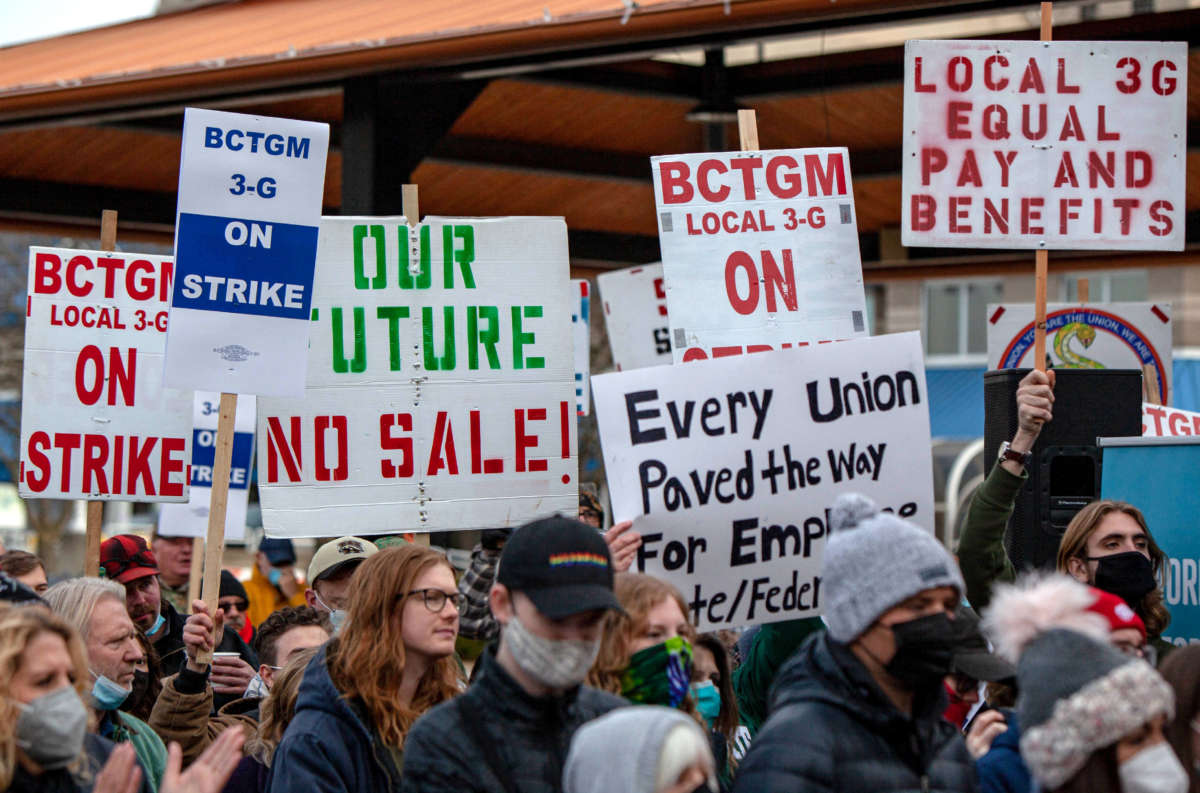Support justice-driven, accurate and transparent news — make a quick donation to Truthout today!
Kellogg union members have approved a new five-year contract with the company, marking an end to an 11-week strike. About 1,400 workers have been on strike since October 5, sparking boycotts of the cereal company’s products as it threatened to permanently replace the striking workers.
According to the union, the new contract contains no concessions from the workers and no permanent two-tier employment system allowing Kellogg’s to offer lower wages and benefits to new employees — one of the primary sticking points for striking workers. The agreement also boasted of wage increases and cost-of-living increases in the first year of the contract.
The Bakery, Confectionery, Tobacco Workers and Grain Millers International Union (BCTGM) praised the contract on Tuesday.
“Our striking members at Kellogg’s ready-to-eat cereal production facilities courageously stood their ground and sacrificed so much in order to achieve a fair contract. This agreement makes gains and does not include any concessions,” said BCTGM International President Anthony Shelton in a statement. “From picket line to picket line, Kellogg’s union members stood strong and undeterred in this fight, inspiring generations of workers across the globe.”
American Federation of Labor and Congress of Industrial Organizations (AFL-CIO) President Liz Shuler praised workers for fighting for the gains in the contract. BCTGM is affiliated with AFL-CIO.
“The decision to strike is never an easy one. It takes an incredible amount of courage & tenacity. But strikes work,” Schuler wrote on Twitter. “There is no tool more powerful than our ability to withhold our labor. And there is power in a union.”
Workers have taken particular issue with a two-tier system that allows the company to offer lower wages and inadequate benefits to newer hires, with little chance for upward movement. The system had been set in place in the contract with workers in 2015, and the company at the time had promised that employees in the second tier would have room for growth.
Instead, the company seems to be limiting the number of employees who are able to see growth in wages and positions; as Jarod Facundo reported for The American Prospect, 15 employees have retired at the company’s Battle Creek, Michigan, plant since the adoption of the 2015 contract, but only one employee has moved up to a “legacy” status with higher pay.
The new contract offers a way out of the lower tier, according to HuffPost’s Dave Jamieson, by automatically advancing workers who have been at the company for 4 years and then capping other advances at 3 percent of the workforce each year. This is better than the original contract offered by the company, which didn’t expand opportunities for growth, but it does not succeed in eliminating the system of a two-tiered workforce for the same jobs.
Trevor Bidelman, president of BCTGM Local 3G representing workers in Battle Creek, told HuffPost that he believed that Kellogg’s threat to permanently replace striking workers was a way of forcing the union’s hand on the issue and that the contract was still not in a place that some members would have preferred it to be. Emphasizing his pride in the workers for the strike, Bidelman said, “The replacement threat was really the biggest piece” in turning out workers to vote for the contract.
Indeed, though the legality of Kellogg’s threat could be questionable, it appeared to have worked for the company as a tactic to get workers to approve the new contract. The company has been facing increasing pressure from the public over the strike, facing a boycott and an online campaign to bog down its job application system to prevent it from hiring replacements.
The workers’ strike had also garnered the support of lawmakers like Sen. Bernie Sanders (I-Vermont), who traveled to Battle Creek on Friday to rally with striking workers. “You’re sending a message not just to Kellogg’s, but to every corporate CEO in this country,” Sanders said in a speech. “You’re saying that in the wealthiest country in the history of the world, you’ve got to give workers a fair shake.”
Criticizing the divisive two-tier system, Sanders said that the company should offer a fair contract, saying “If you love America, you love the workers.”
Trump is silencing political dissent. We appeal for your support.
Progressive nonprofits are the latest target caught in Trump’s crosshairs. With the aim of eliminating political opposition, Trump and his sycophants are working to curb government funding, constrain private foundations, and even cut tax-exempt status from organizations he dislikes.
We’re concerned, because Truthout is not immune to such bad-faith attacks.
We can only resist Trump’s attacks by cultivating a strong base of support. The right-wing mediasphere is funded comfortably by billionaire owners and venture capitalist philanthropists. At Truthout, we have you.
Truthout has launched a fundraiser to raise $41,000 in the next 7 days. Please take a meaningful action in the fight against authoritarianism: make a one-time or monthly donation to Truthout. If you have the means, please dig deep.
